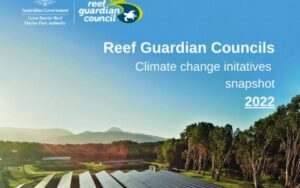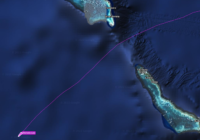A new report has showcased real actions being taken by 19 local councils to help reduce climate change impacts on the iconic Great Barrier Reef (the Reef).

The Great Barrier Reef Marine Park Authority (Reef Authority) has released the Reef Guardian Councils Climate Change Initiatives Snapshot this week, highlighting the proactive resourcefulness of the program – which is a collaboration between councils in the Reef catchment area and the Reef Authority.
Reef Authority CEO, Josh Thomas, said climate change is the greatest threat not just to our Great Barrier Reef but to coral reefs worldwide.
“The Reef Authority’s climate change position statement emphasises only the strongest and fastest possible actions to decrease global greenhouse gas emissions will reduce the risks and limit the impacts of climate change on the Reef,” Mr Thomas said.
“Climate change is a global issue, requiring a global response and local and regional approaches are central to protecting and managing the Reef.
“The Reef Guardian Councils Climate change initiatives snapshot showcases some of the key actions Councils are taking to limit the impacts of climate change on the Reef.
“These collective actions are also critical to meeting the Australian Government’s commitment to reduce greenhouse emissions by 43 per cent below 2005 levels by 2030, and to net zero by 2050.”
Reef Guardian Councils executive committee chairperson and Cassowary Coast Shire Councillor Jeff Baines said caring for the Reef is a shared responsibility.
“Councils play a significant role in how their communities interact with and protect the Reef, through planning and policy, effective management of water, waste and land, and community education,” Cr Baines said.
“The Snapshot highlights council actions such as purchasing clean energy, developing policies and strategies to support emissions reduction, changing street lighting to LED, using landfill gas for energy production, and recycling organic waste.”
In Australia, around 13 million tonnes of carbon dioxide equivalent is created as a result of organic waste going to landfill. Two Reef Guardian Councils are currently trialling kerbside food organics and garden organics waste collection, which diverts organic waste from landfill and turns it into compost and soil conditioner.
Other initiatives include installing solar, bike paths and the introduction of electric or hybrid fleet vehicles.
The Reef Guardian Councils Climate Change Initiatives Snapshot can be viewed at the Reef Authority’s website. www.gbrmpa.gov.au







